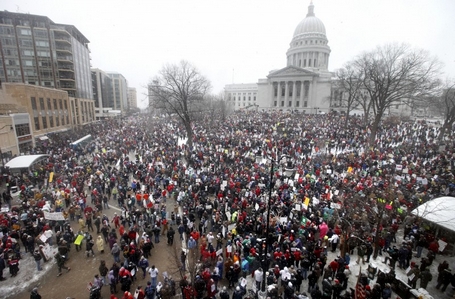State Workers Now Contribute Twice as Much for Benefits
Will this be an issue in gubernatorial campaign?
The week after the Wisconsin Supreme Court upheld Act 10, which all but eliminated collective bargaining by most public employees and raised their co-pays for health insurance and pensions, it’s a good time for a follow-up question: Three years later, how much more do state employees pay for health care and pension benefits?
Numbers last week from the state Department of Employee Trust Funds, which keeps score, could trigger a new election-year debate over that issue. If you agree with Republican Gov. Scott Walker’s 2010 statement that the fringe benefits of public employees made them “the haves,” and taxpayers the “have nots,” you’ll be glad to know that state employees paid $379.68 million for health care and pensions in calendar 2013 – more than double the $163.81 million they paid in 2011.
In that period, what state employees pay for pensions went up the most. The figure tripled, rising from $81.96 million in 2011 to $249.68 million in 2013.
Unions and other Democratic groups backing Mary Burke for governor in the Nov. 4 election can argue that those numbers prove that state workers stepped up the fiscal plate by doubling their contributions for health care and pensions. But they didn’t have a choice. Except for police officers and firefighters, Act 10 forced them to either pay more for benefits, quit or retire.
But TEA Party types may cite these new ETF numbers to argue that fringe benefits for state workers are still too generous: State workers paid 12 percent of the $1.08 billion that health-care cost in 2013, for example, and 54 percent of the $555.3 million that had to be set aside for their pensions that year.
Changes Walker could still seek: Abolishing the defined-benefit pension system for new employees and replacing it with a 401(k) plan. Converting health care for state workers to a self-insured plan. Eliminating the benefit that lets state workers convert unused sick leave into health-care premiums when they retire.
For comparison purposes, let’s look at how much employees and state agencies paid for those two fringe benefits in years before and after Act 10:
*Calendar 2013: State employees paid 23.2 percent, and state agencies 76.8 percent of total health insurance and pension costs. Employees paid $379.68 million for these two benefits; state agencies, $1.25 billion.
*Calendar 2011: State employees paid 10 percent, and state agencies 89.8 percent, of insurance and pension benefits costs. Employees paid $163.8 million for these two benefits, and state agencies $1.43 billion.
Andrew Reschovsky, professor emeritus at UW-Madison’s La Follette School of Public Affairs, reflected on what he calls the “true costs” of Act 10 on public workers: “Many individuals willingly accept public sector jobs at lower salaries than they could otherwise earn in return for a more generous package of benefits,” he explains. “Thus, any discussion about how much we pay public employees should start by comparing total compensation, the sum of both salary and benefits.”
Reschovsky says studies have repeatedly tried to measure whether public employees are “overpaid.” But that’s difficult because, “a public job – for example, a firefighter – doesn’t exist in the private sector… The mix of occupations in the public and private sectors is far from identical.”
Still, these studies have “generally” found that public employees are not overpaid, with this exception: “Low-skill jobs in the public sector are frequently better compensated than similar jobs in the private sector. The opposite is generally true for higher-skill jobs.”
Over a period of time, often “our most productive” public workers will quit, Reschovsky adds. But “many” of them will stay – primarily to keep their pension and health-care benefits.
Low compensation for years, followed by Act 10 changes requiring them to pay much more for pensions and health care will take its toll on Wisconsin public employees, Reschovsky predicts: “Morale will be reduced and it is only human nature that many individuals will be less motivated to work hard, less innovative, and less committed to their jobs,” he adds.
Needless to say, Walker and Republicans would take issue with that assessment. Regardless of whether the GOP keeps control of the Capitol next year, this debate is far from over.
Steven Walters is a senior producer for the non-profit public affairs network WisconsinEye. Contact him at stevenscwalters@gmail.com
The State of Politics
-
A Wisconsin Political Trivia Quiz
 Dec 15th, 2025 by Steven Walters
Dec 15th, 2025 by Steven Walters
-
The Fight Over Wisconsin’s House Districts
 Dec 8th, 2025 by Steven Walters
Dec 8th, 2025 by Steven Walters
-
The Battle Over On-Line Betting
 Nov 24th, 2025 by Steven Walters
Nov 24th, 2025 by Steven Walters






















Since no individual employee’s total compensation was directly lowered as a result of Act 10, all it served to do was shift the cost allocation and take $215.88 million out of the state economy. Between 2011 and 2013, the total outlay was actually $35.88 million more following Act 10. So it didn’t save “us” any money and probably will end up costing more in the long run with the massive disruption to continuity of skills and services.
Does anyone care to venture a guess as to why the cops in the southern states don’t care? It’s because they’re underpaid and treated like dogs by their employers.
Think about how that may translate elsewhere…
All public workers have been punished with a permanent pay cut. The statement that they contribute to the pension and health care is another way of saying “pay cut’. ALEC laws like ACT 10 were written by corporations to start the tide of booting out union representation for workers. Republicans are likely to enact right-to-work legislation to further restrict unions in private business and further lower wages across the state. It is outright theft of rights and actual wages by Republicans and a transfer of wealth through further privatization efforts so corporations can feed at the public trough.
All these actions put a huge drag on small business opportunities since regular people will have less money to spend locally. It is a downward spiral and state by state comparisons in the Midwest are confirming the results of these actions.
No “rights” were violated by ACT10. The unions did this to themselves… for too long they had the upper hand and left government official’s hands tied. It just built up to the point of their own undoing.
Besides, in this day in age it is not unreasonable to ask public sector workers to provide for part of their own retirement savings. Lucky for the average public sector worker… say a teacher making 50k, if they decided not to renew their union membership the before tax pension benefits contributions are almost a complete wash with savings from post-tax (and tax deductible) yearly union dues and fees.
Andy do you think police and firefighter unions should have been exempt from Act 10, if the unions did in fact do this too themselves?
What is the context of your question?
If you are asking whether they should have included police and firefighters on ACT10, no. It may not have passed if they did.
If you are asking ideologically whether I believe they should have a similar law passed for them… probably. Although I don’t see that being possible.
I just wonder how ACT 10 supporters feel about the decision to exempt the police and firefighter unions. I hear nonstop bashing of the teacher’s union, yet nary a peep about police and firefighter unions, even though they act in similar fashion, protecting the interests of their members.
There should have been no law in the first place that banishes unions. This is a country-wide problem with laws written by corporations and spread by ALEC to put the boot into people. It is a form of 21st Century fascism where corporations and wealth have all the power and control of the political process. It is simply wrong and Un-American.
Separation of police and fire unions was just another divisive strategy or the divide and conquer.
Andy,
You drink the same kool-aide that Walker and many others do. Pensions and health care are part of pay and compensation. Asking people to pay into them is semantics and a pay-cut, pure and simple. Many public sector employees went with lower wages to accept payment in benefits. That was the trade-off that politicians made with workers.
In the city of Milwaukee, a residency requirement was installed in return for paid health care. This is when it was rather cheap in the late 70s and early 80s. Healthcare prices exploded in the 90s and beyond an became a problem. The pension issue has never been a high cost to the public and it is well run and funded. In some years, no contributions had to be made. Paid healthcare became a problem for all public and private companies that supplied it as a benefit when the cost exploded.
Employers started this system of healthcare as a benefit during WWII. The better option would be take healthcare out of employers’s hands altogether and have a universal coverage plan that all could buy into.
David, I can’t help but get a laugh out of your accusation of “drinking the Kool-aide” when all you do is spout your same rhetoric about ALEC and corporations when corporations have nothing to do with ACT10. It’s just the reality of the times that employee benefit costs are rising out of control and it doesn’t matter if it is private sector or public, you have to find ways to keep them in check somehow. The unions blocked all attempts at this until they got to the point where they saw the end coming.
Yes, it was a paycut. I too took a paycut during the recession… it sucks. I sympathize with all of the public sector workers who pay more out of pocket now. On the other hand, we have a balanced budget, schools districts and other local forms of government have more flexibility in their personnel decisions (although are still bound by labor laws just like any other entity), and we can finally focus on real economic recovery.
Basically the only argument you have is that it is a pay cut? Because I don’t think anyone disagrees with you on that. Luckily those people who do not want to be part of a union can pretty much make up that entire amount.
With influential groups like WMC behind it, along with the heads of large businesses like ABC Supply, is it really accurate to state that corporations had nothing at all to do with Act 10? And it might be easier to believe that Act 10’s only purpose was to aid the state’s economy if Walker didn’t exempt police & firefighter unions and talk about using it to “divide and conquer.”
The ends of a so-called “balanced budget” does not justify the means of a corrupt style of governance, that is sleazy, divisive, and offensive, that continually robs citizens of rights and steals their wages. Robbed wages from public workers has gone to pay off corporate tax breaks and Walker’s benefactors, and said tax breaks have left the state to create jobs elsewhere in another country. ACT 10 has done absolutely nothing to stimulate the state economy that is on a downward spiral. Facts suggest we are now a bottom in class state. Workers with less pay, spend less, and small businesses suffer greatly.
The power of unions is another sleazy sell by corporations and a propaganda story repeated often times as a right-wing overall strategy. Unions have lost their power long ago and now represent about 10% of the population in the USA. At least unions stick up for workers rights. As unions disappear, corporations and public employers take advantage of the work force and treat many poorly, and run rough shod over any labor laws. Most citizens do not spend time studying the assortment of labor laws regarding them and do not have the capacity to hire an attorney to defend them in a corrupt work environment. That is the entire point of removal of unions – weaken the worker and their support system. Unions help support the benchmark for all workers, non-union and even management.
Unions may have had their problems, but corporations run this country, not the unions. Corporations’ main concern is with profit and with many of them at all cost, and cheat on taxes if they can get away with it. Unions are supposed to stick up for people, corporations do not. Government is supposed to be by the people, not by the corporations and their sole benefit.
I have been in management and union positions. I know the strengths and weaknesses of both positions.
David, do you really believe the unions are these poor innocent, “fight the good fight” organizations that you proclaim them to be?
Also, please tell me what “rights” were violated by ACT 10.
Unions have held all the power for public sector employment for too long. They have tied the hands of local governments to make common sense personnel decisions, they have forced them to use overpriced health plans, they have protected senior employee’s at the cost of younger ones and the people they serve, and more. The unions are indeed supposed to stick up for people… unfortunately they’ve only been sticking up for those in power.
I’d discuss your business comments… but I haven’t seen any that directly relate to ACT10 or this discussion.
As I stated unions have had their problems including defense of some of the biggest offenders of good work practices in the work environment. And a lot of their human resources were spent in this fashion to the demoralization of many others in the workplace. That is the role of a union to fight for the worker and provide representation and a due process for places that have a corrupt work environment. Loss of union representation increases work place abuses by management and co-workers. Today only 10% of the work force in the USA is union represented.
Rights are to representation in the workplace, respect, dignity, fairness, freedom from corrupt management, safe working conditions, 8-hours work for 8 hours pay.
Act 10 caused an estimated 50,000 in job losses. These losses will grow since the salary losses are permanent. Every dollar lost in a local community is a loss of two additional dollars of economic churn. Act 10 and other actions by Walker and the Republican legislature has poisoned the Wisconsin work climate. Two neighbor teacher friends have left the state for better work environments. My son left the state with his family last year for a job elsewhere. Our state’s poor standing is proven when you look at other states in the Midwest and on a national level.
To be fair, Wisconsin and the entire country has been shedding millions of quality jobs for the last 35 years. A lot of this is related to tax policies, business practices, and shopping for the lowest price at sometimes our own workforce demise. I have not heard good answers from any politicians, private business, MJS articles, other than chasing the same past dreams. We have the least educated governor and state legislature in modern history and given their lack of exposure to education, best practices, ideas, I have zero trust in them and expect more damage to come. Laws written by corporations through ALEC are not the answer. That is nothing but 21st Century fascism. It is sad to see this state that I have lived as a 6th generation citizen of Milwaukee.
People complained government employee compensation packages were too high, and they did nothing.
Corporations complained state taxes and regulations were too high and left, and they did nothing.
Illegal immigration leveraged wages lower and lessened taxes contributed, and they did nothing.
Illegal immigrants depleted funds for social services, and they did nothing
People in their Party didn’t vote for them after feeling abandoned and betrayed and they lost the election.
This time they did something; They blamed everyone possibly involved with the only exception being themselves.